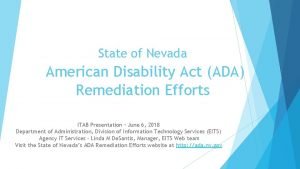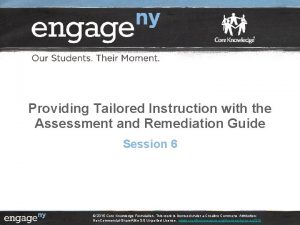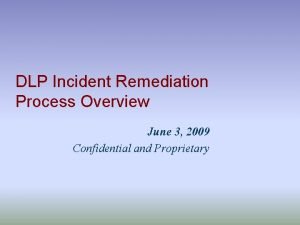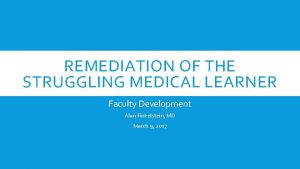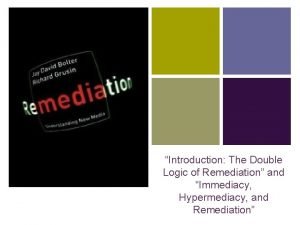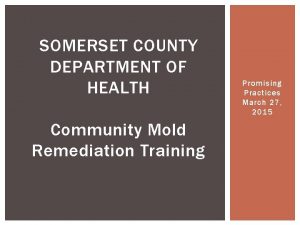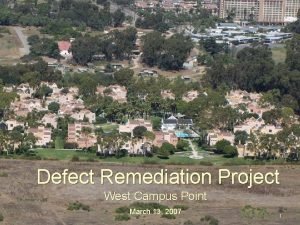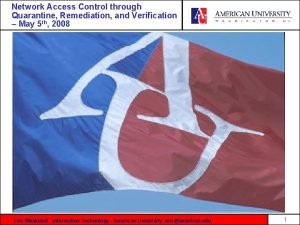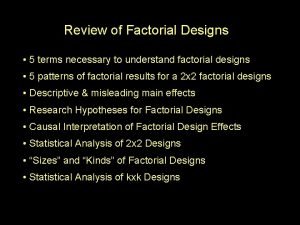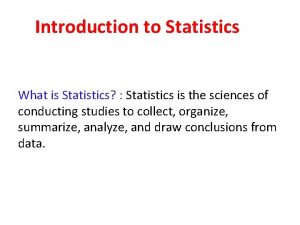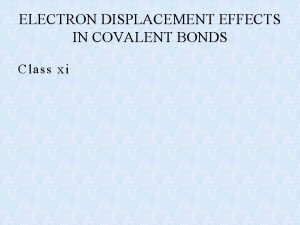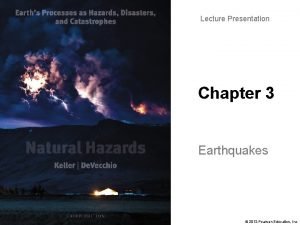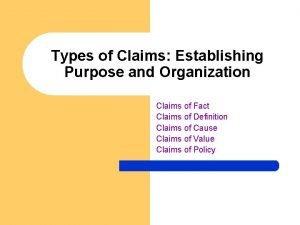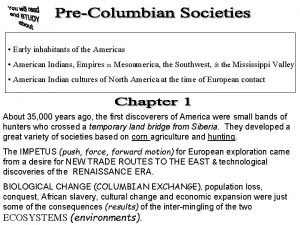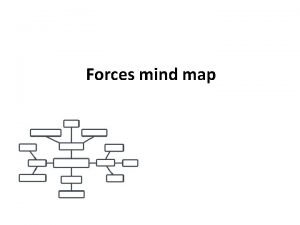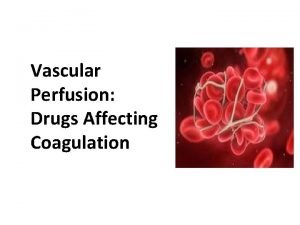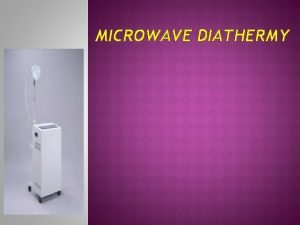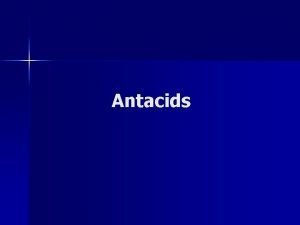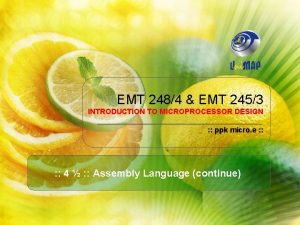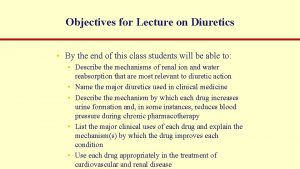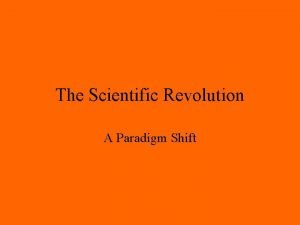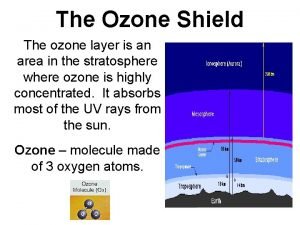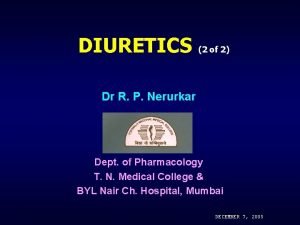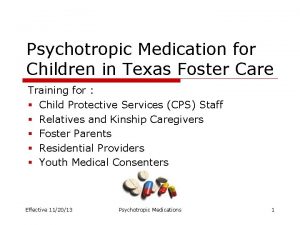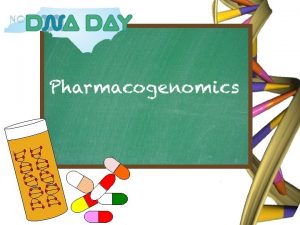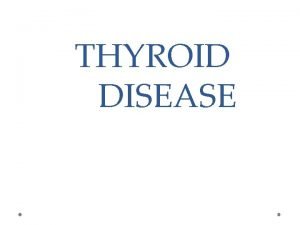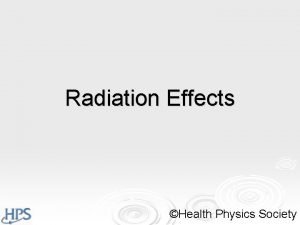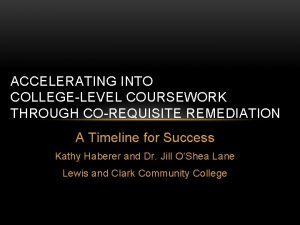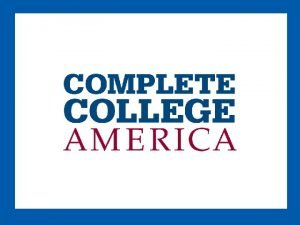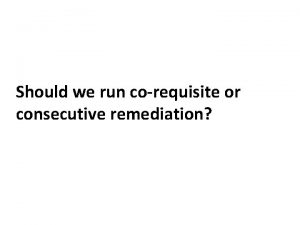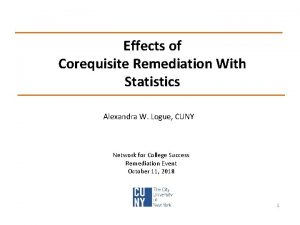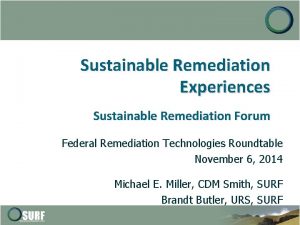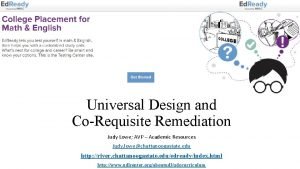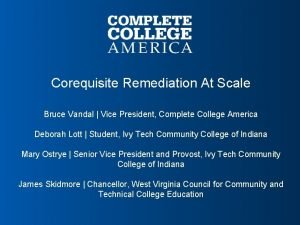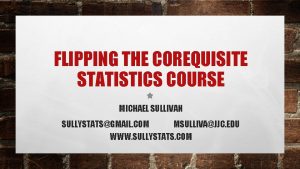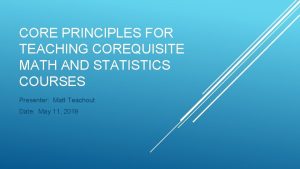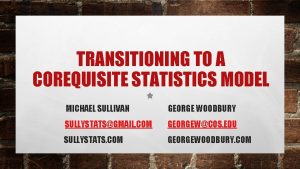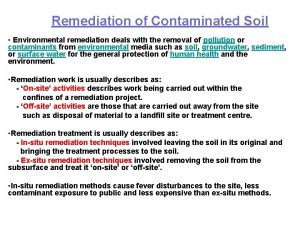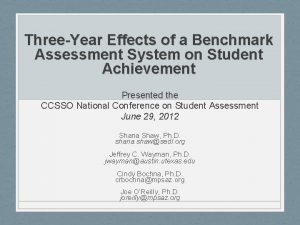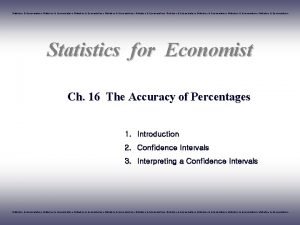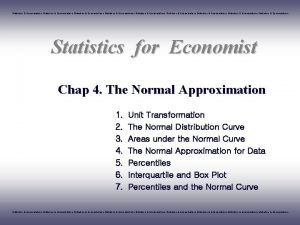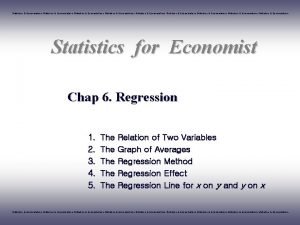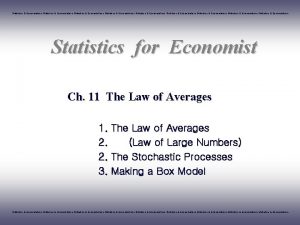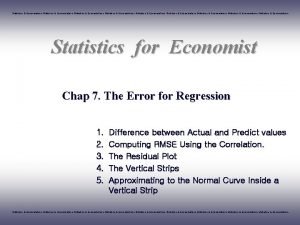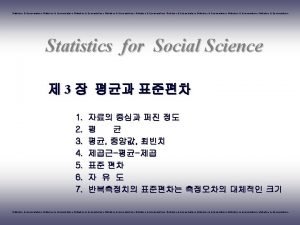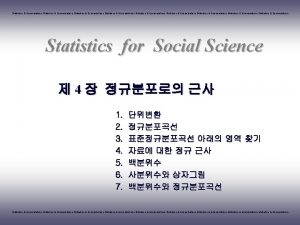ThreeYear Effects of Corequisite Remediation With CollegeLevel Statistics






































- Slides: 38

Three-Year Effects of Corequisite Remediation With College-Level Statistics Alexandra W. Logue, CUNY Daniel Douglas, Rutgers University Mari Watanabe-Rose, CUNY 2018 CADE Conference Washington, D. C. June 15, 2018 1

Supported by: The Spencer Foundation The City University of New York (CUNY) 2

This Presentation • Randomized controlled trial investigating the effects of corequisite math remediation on student success • Initial research was published in 2016 in Educational Evaluation and Policy Analysis • That paper looked at effects on performance of CUNY students in associate-degree programs through one year after the intervention • Now we have three-year follow-up data including graduation rates 3

First some information and context Theory: Remedial courses prepare unprepared students for college-level work. 4

Actual results of traditional remedial courses • • • Course pass rates are low Persistence and graduation rates are low Financial aid can be depleted Student loan default is high Civil rights are violated 5

Completion of mathematics remediation is the single largest academic barrier to college completion Community College Research Center (2014) 6

Alternative: Corequisite Remediation 7

Some of the data supporting corequisite remediation Corequisite remediation has been shown successful with collegelevel courses in: chemistry, mathematics, reading, sociology, and writing (Belfield, Jenkins, & Lahr, 2016; Burdman, 2013; Cho, Kopko, Jenkins, & Jaggars, 2012; Denley, 2016; Edgecombe, Jaggars, Xu, & Baragan, 2014; Hern & Snell, 2014; Hesser & Gregory, 2016; Jaggars, Hodara, Cho, & Xu, 2015; Parker, Traver, & Cornick, 2018; Royer & Baker, 2018; “Scaling Co-Requisite Supports at the Tulsa Community College”; “Scaling Co-Requisite Supports at the University of Central Arkansas, 2018”; Vandal, 2014) 8

But people said… o Those data don’t prove corequisite remediation is better. o Those data are primarily descriptive. o They don’t involve controlled studies. o The students in the corequisite courses and/or the faculty teaching them may not be the same as in traditional remedial courses. o Even with extra help, these students can’t pass college-level courses. 9

Randomized controlled trial conducted in fall 2013 907 students at 3 CUNY community colleges, all assessed as needing remedial elementary algebra, and who did not need college algebra for their majors, were randomly assigned to: • Group EA: Traditional remedial elementary algebra (control) • Group EA-WS: Traditional remedial elementary algebra with a weekly workshop • Group Stat-WS: Introductory, college-level, statistics with a weekly workshop (corequisite remediation) 10

Some methodological details • Students were randomly assigned in summer 2013 to courses in fall 2013 • Workshops were 2 hours per week, led by advanced undergraduates • Each instructor taught one section of each course type (EA, EA-WS, and Stat-WS) 11

Evidence of Stat-WS Students Being the Most Motivated of the Three Groups • Group EA-WS had the highest rate of summer melt • Stat-WS Students were more likely than those in EAWS to attend their workshops • Stat-WS students were more likely to report forming their own study groups than the other two groups 12

Course Pass Rates in Fall 2013 70 (%) 60 (N=717) n=246 55. 7% 50 40 30 n=244 44. 9% 39. 3% 20 10 0 EA (Traditional Remediation) Stat-WS (College-Level Course + Workshop) 13

Marginal Effect of Math Placement Score on Probability of Passing by Group Assignment 0, 9 Probability of Passing 0, 8 0, 7 0, 6 0, 5 0, 4 0, 3 0, 2 -1 -0, 5 0 0, 5 1 COMPASS Algebra, Z-Score Group EA (N=230) 1, 5 2 Group Stat-WS (N=217) Mean (SD) Compass test score = 25. 0 (6. 5) 14

But people said… o The statistics students only did better than the elementary algebra students because the faculty were easier on the statistics students. o For this reason, and because they never had the elementary algebra they were supposed to have, the statistics students won’t be able to pass other courses. 15

Credits Accumulated So, not including statistics courses, how many credits did EA and Stat-WS students accumulate by 1 year after the experiment? EA students: 16 Stat-WS students: 19 16

Quantitative-course status of participants one year after experiment’s end EA (n=244) Stat-WS (n=246) 50% 38% 34% 5% 16% 57% basic quantitative skills not proficient basic quantitative skills proficient but have not passed a college-level quantitative course passed college-level quantitative course 17

Data up to here were in original paper • Results first publicly presented at CADE in 2014, with additional data presented at CADE in 2016 • Article published online in EEPA in July 2016 • Published in print in EEPA in September 2016 • Received What Works Clearinghouse “without reservations” rating in March 2018 18

But despite our randomized controlled trial, people said… o Stat-WS students will not continue to do well o They don’t have the elementary algebra they need for their natural and social science general education courses 19

Percentage of Students Completing Each of CUNY’s General Education Categories Within Three Years Mathematical and Quantitative Reasoning* Scientific World Life and Physical Science Creative Expression Stats-WS World Cultures EA US Experience Individual and Society English Composition *Difference between groups is statistically significant at p<. 01 0 10 20 30 40 50 60 70 80 90 100 20

But people said… o The Stat-WS students will not take and pass the math courses that need elementary algebra and college algebra as a prerequisite o Some EA students will take elementary and college algebra and get excited by math so that they take advanced math courses, but Stat-WS students will not have that opportunity 21

All math courses taken and passed by EA and Stat-WS students in the three years since the experiment 22

But people said… o Students assessed as needing elementary algebra can’t take and pass college algebra without passing elementary algebra first 23

Number of Stat-WS students who passed their assigned statistics course during the experiment (fall 2013) and later passed college algebra without ever having taken elementary algebra and with no additional assistance: 14 24

But people said… o If you don’t make these students take elementary algebra, they will not be able to later change their mind and complete mathintensive majors 25

All students who graduated within three years with a major requiring college algebra or above EA Stat-WS Associate in Engineering A. S. in Science Associate in Computer Science Assoc. in Business Admin. A. S. in Liberal Arts A. Bus. 26

But people said… o Changing one course requirement won’t affect graduation rates, and it certainly won’t increase graduation rates. 27

EA and Stat-WS graduation rates three years after the experiment was conducted: 100% 90% Percentage of Students 80% 9, 8% 7, 4% 9, 4% 10, 8% 6, 7% 70% 60% 14, 5% 20, 5% 19, 9% 50% 52, 9% 20% 48, 1% Enrolled in Associate's Not Enrolled 10% 0% Associate's Degree, not Enrolled Bachelor's Enrolled in Bachelor's 40% 30% Associate's Degree, Enrolled Bachelor's EA N=297 Stat-WS N=297 28

Summary of 3 -Year Results Group EA Stat-WS Not Enrolled 52. 9% 48. 1% Enrolled 30. 0% 26. 7% Graduated 17. 2% 25. 3% • Graduation rate of Stat-WS students is 8. 1 percentage points higher than that of EA students • 47% more Stat-WS students graduated than EA students 29

But some people said… o Because it took only a D to pass Stat-WS, but a C to pass Elementary Algebra, Stat-WS was easier to pass, and the students who passed it with a D must not have done well afterwards. 30

Graduation rate Of all EA students who passed EA during the experiment: 28% Of Stat-WS students who passed Statistics during the experiment but only with a D: 41% 31

But some people said… o Maybe the Stat-WS students graduated at a higher rate, but they won’t do as well as the EA students after graduation because they won’t have had the elementary algebra that people need for their jobs. 32

Postgraduation Performance • We don’t have employment data for the students in our experiment (yet) • But two recent studies have shown that, for the great majority of jobs, algebra is not needed. In contrast, having taken statistics may help increase women’s postgraduation salary (Belfield & Liu, 2015; Douglas & Attewell, 2017) 33

Effects on Performance Gaps • None of our results differ by students’ race/ethnicity • Given that students from underrepresented groups are more likely to be assigned to math remediation, and given that corequisite remediation helps all students assigned to math remediation similarly, corequisite remediation can help decrease graduation rate gaps between underrepresented and other students. 34

And if you are interested in the cost of education: Of all EA and Stat-WS students randomly assigned: Mean number of math courses an EA student had to take to pass his/her general education quantitative requirement: 5. 2 Mean number of math courses a Stat-WS student had to take to pass his/her general education quantitative requirement: 2. 6 35

Conclusions • Students assessed as needing elementary (remedial) algebra & not majoring in a math-intensive major: – are more likely to pass assigned course if instead take college-level statistics with extra support – are more likely to graduate, including passing collegelevel general education social & natural science courses and all types of math courses • This approach can help close performance gaps 36

Conclusions cont’d: • Corequisite math remediation works! • Why isn’t everyone using it? (in 2016 survey, 35% of public 2 -year colleges had corequisite Reading/Writing, and 16% had corequisite Math; Rutschow & Mayer, 2018) • Why doesn’t everyone even know it works? • What can we do about all this? 37

Thank you! Lexa Logue: Email: alexandra. logue@cuny. edu; Website: https: //awlogue. com/ ; Twitter: @Lexa. Logue; Dan Douglas: daniel. douglas@rutgers. edu Mari Watanabe-Rose: mari. watanabe@cuny. edu 38
 Nv eits
Nv eits Ckla assessment and remediation guide
Ckla assessment and remediation guide Dlp incident management process
Dlp incident management process Remediation plan in change lifecycle
Remediation plan in change lifecycle Remediation of the struggling medical learner
Remediation of the struggling medical learner Immediacy hypermediacy and remediation
Immediacy hypermediacy and remediation Somerset mold remediation
Somerset mold remediation Site remediation toronto
Site remediation toronto Wcp envelope
Wcp envelope Network access quarantine control
Network access quarantine control Sox remediation software
Sox remediation software 2x2 factorial design
2x2 factorial design Introduction to statistics what is statistics
Introduction to statistics what is statistics Electron displacement effects in covalent bonds class 11
Electron displacement effects in covalent bonds class 11 French revolution causes
French revolution causes 5 effects of earthquakes
5 effects of earthquakes Environmental effect of disaster
Environmental effect of disaster Example of cause and effect
Example of cause and effect Tiens cell rejuvenation capsules side effects
Tiens cell rejuvenation capsules side effects What god
What god Forces mindmap
Forces mindmap Causes inflation
Causes inflation Pathophysiology of hemophilia ppt
Pathophysiology of hemophilia ppt Microwave diathermy definition
Microwave diathermy definition Antacids side effects
Antacids side effects Calcium channel blockers side effects
Calcium channel blockers side effects Cma instruction effects which flags of 8085
Cma instruction effects which flags of 8085 Loop diuretics adverse effects
Loop diuretics adverse effects Nutriferon side effects
Nutriferon side effects Effects of scientific revolution
Effects of scientific revolution Reactive effects of experimental arrangements
Reactive effects of experimental arrangements Cotton gin effects
Cotton gin effects Astemazole
Astemazole Effect of ozone depletion on plants
Effect of ozone depletion on plants Emergency drugs in icu
Emergency drugs in icu Lamictal side wffects
Lamictal side wffects Central dogma
Central dogma Thyroid
Thyroid Radiation effects on chromosomes
Radiation effects on chromosomes
